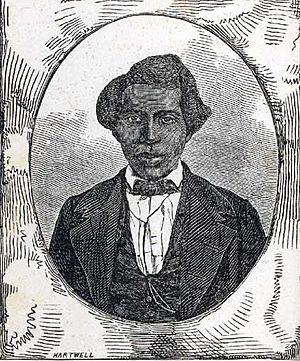Tunis Campbell facts for kids
Quick facts for kids
Tunis Campbell
|
|
|---|---|
 |
|
| Personal details | |
| Born | April 1, 1812 Middlebrook, New Jersey, U.S. |
| Died | December 4, 1891 (aged 79) Allston, Boston, Massachusetts, U.S. |
| Political party | Republican |
Rev. Tunis Gulic Campbell Sr. (April 1, 1812 – December 4, 1891) was a very important leader for African Americans during the Reconstruction era in Georgia. He was known as a respected clergyman in the African Methodist Church.
Campbell worked hard to help people register to vote. He also served as a Justice of the Peace, which meant he could help with local legal matters. He was a delegate to a big meeting called the Georgia Constitutional Convention of 1867–1868. Later, he became a Georgia state senator.
He even wrote a book about his life called Sufferings of the Reverend T.G. Campbell and His Family in Georgia (1877). Tunis Campbell was a major figure in helping African Americans gain their rights after the Civil War. He even had a group of about 400 people to protect him from groups like the Ku Klux Klan. Sadly, like the governor at the time, he eventually had to leave Georgia to stay safe.
Contents
Tunis Campbell's Early Life
Tunis Campbell was born on April 1, 1812, in Middlebrook, New Jersey. He was one of ten children in his family; his father was a blacksmith. When he was five years old, a white man took him in and sent him to an Episcopal boarding school in Babylon, Long Island, New York. He was the only Black student there.
He stayed at this school until he was 18. After school, he decided not to become a missionary in Africa. Instead, he became an abolitionist, which meant he worked to end slavery. He also spoke out against the idea of sending free Black people to Africa. In 1832, he started a group in Brooklyn to fight against this idea.
Working in New York City
For a few years, Tunis Campbell worked as the main waiter at the Howard Hotel in New York City. He was very good at his job. In 1848, he wrote a helpful guide for hotel management called Hotel Keepers, Head Waiters, and Housekeepers' Guide. This was the first book of its kind! It included recipes and ideas on how to organize and manage African-American workers in hotels.
At the same time, Campbell was busy helping to create schools for Black children. He helped set up schools in New York, Brooklyn, New York, Williamsburg, New York, and Jersey City, New Jersey. He also helped fugitive slaves who were escaping to freedom. Later, he even helped recruit 4,000 soldiers for the United States Colored Troops, who were Black soldiers fighting in the Civil War.
Leading Change in Georgia
In March 1865, after the Civil War ended, Tunis Campbell was sent to the Sea Islands of Georgia. These islands included Ossabaw, Colonels, St. Catherine's, and Sapelo Island. He was like a military governor there for two years. During this time, he helped set up schools and a new government for the people living on the islands.
However, in 1866, former slave owners got their land back from President Andrew Johnson. They forced the Black farmers off the islands. So, Campbell bought 1,250 acres of land at Belle Ville in McIntosh County, Georgia. There, he created a group of Black landowners who could buy their own small pieces of land. He effectively helped establish new communities for them.
A Politician in Georgia
In 1867, Tunis Campbell was chosen to be on the Board of Registration in Georgia. His job was to help newly freed Black men register to vote. During this time, he and another Black registrar were poisoned. Sadly, the other registrar died.
Campbell also joined the Georgia Educational Association. This group helped many Black leaders start their political careers during Reconstruction. In 1868, he was elected as a state senator in Georgia. His son, Tunis Gulic Campbell Jr., also ran for state representative and won!
However, many white Georgia lawmakers did not want Black people to hold office. They expelled Campbell Sr. and his son, saying that even though Black people could vote, the Georgia constitution did not allow them to be elected officials. This event is known as the Original 33.
Tunis Campbell Sr. was able to return to his office in 1871. But he lost his re-election bid in 1872. While he was a state senator, Campbell worked on important committees dealing with petitions and education. After his time in the legislature, he continued to serve as a Justice of the Peace. This role gave him authority, which made some former slave owners very angry because a Black man had authority over white people.
Later, Tunis Campbell faced many unfair accusations. These accusations were largely made by people who wanted to remove him from Georgia politics. He was forced to do hard labor in a Georgia prison. After he was released, he left Georgia for good. In 1877, he wrote a pamphlet about his difficult experiences.
Later Life and Passing
Tunis Campbell passed away in Allston, Boston, Massachusetts, on December 4, 1891.
 | Ernest Everett Just |
 | Mary Jackson |
 | Emmett Chappelle |
 | Marie Maynard Daly |

